About the experts (in alphabetic order by last name):
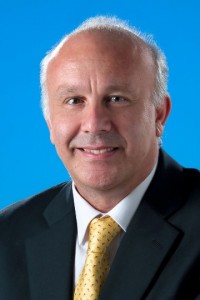 Jospeh Agius, Ed.D., is a Speech Language Pathologist with special interest in fluency disorders and humour research. As partner expert nominated by the University of Malta, Dr. Agius collaborates with experts from thirteen European Universities and two centres of excellence on the development and delivery of the ‘European Clinical Specialization Course in Fluency Disorders’. He is Senior Practitioner of the Speech Language Department and employed by the Health Division, Government of Malta. Dr. Agius is visiting senior lecturer at the University of Malta lecturing on ‘Fluency Disorders’, ‘Language and Psychiatry’, ‘Creativity, Humour and Communication’ and ‘Legal and Ethical Issues’. He is a member on the Fluency Committee of the International Association of Logopedics and Phoniatrics (IALP). He is author of the iOS application ‘Fluency SIS’ – Smart Intervention Strategy for school- age children who stutter. Jospeh Agius, Ed.D., is a Speech Language Pathologist with special interest in fluency disorders and humour research. As partner expert nominated by the University of Malta, Dr. Agius collaborates with experts from thirteen European Universities and two centres of excellence on the development and delivery of the ‘European Clinical Specialization Course in Fluency Disorders’. He is Senior Practitioner of the Speech Language Department and employed by the Health Division, Government of Malta. Dr. Agius is visiting senior lecturer at the University of Malta lecturing on ‘Fluency Disorders’, ‘Language and Psychiatry’, ‘Creativity, Humour and Communication’ and ‘Legal and Ethical Issues’. He is a member on the Fluency Committee of the International Association of Logopedics and Phoniatrics (IALP). He is author of the iOS application ‘Fluency SIS’ – Smart Intervention Strategy for school- age children who stutter. |
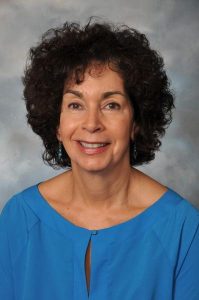 Dr. Barbara J. Amster is Professor, Chair, and Graduate Director in the Department of Communication Sciences and Disorders, at La Salle University where she teaches the graduate course in fluency and stuttering. She is a licensed and certified speech-language pathologist with Board Specialty Certification in Fluency Disorders from the American Speech-Language-Hearing Association (ASHA). She is an ASHA Fellow. Her research involves perfectionism in people who stutter (PWS) and has presented and published articles on perfectionism and the therapeutic use of cognitive behavioral therapy with PWS. Dr. Barbara J. Amster is Professor, Chair, and Graduate Director in the Department of Communication Sciences and Disorders, at La Salle University where she teaches the graduate course in fluency and stuttering. She is a licensed and certified speech-language pathologist with Board Specialty Certification in Fluency Disorders from the American Speech-Language-Hearing Association (ASHA). She is an ASHA Fellow. Her research involves perfectionism in people who stutter (PWS) and has presented and published articles on perfectionism and the therapeutic use of cognitive behavioral therapy with PWS. |
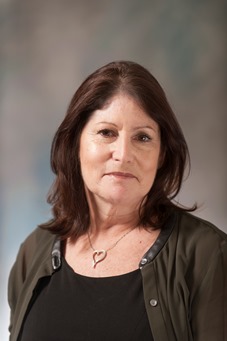 Nan Bernstein Ratner (CCC-SLP, F-ASHA, BCS-CLD) is a Professor in the Department of Hearing and Speech Sciences, University of Maryland, College Park. Dr. Ratner’s primary areas of research are fluency development and disorder, psycholinguistics and the role of adult input and interaction in child language development. The author of numerous research articles, chapters and edited texts, she is the co-author of A Handbook on Stuttering (6th ed) with the late Oliver Bloodstein, as well as The Development of Language (7th ed) andPsycholinguistics (2nd ed.), both with Jean Berko Gleason. Her work in stuttering has focused particularly on the role of language formulation in the etiology and persistence of stuttering, the efficacy of advisement to parents of stuttering children, and the application of evidence-based practice to stuttering treatment. Her most recent project, with funding from both the NIDCD and the National Science Foundation is the new FluencyBank project (with co-PI Brian MacWhinney of Carnegie-Mellon University). FluencyBank is an open-access repository for fluency data that can be shared for research and teaching purposes. It will also support development of computational resources for research and clinical use in fluency disorders. In 2014, in recognition of her work in these areas, she was named a recipient of the Honors of the American Speech-Language-Hearing Association, as well as a Fellow of the American Association for the Advancement of Science. In 2006, Professor Bernstein Ratner received the Distinguished Researcher award from the International Fluency Association. In 2016, the National Stuttering Association named her Professional of the Year. Nan Bernstein Ratner (CCC-SLP, F-ASHA, BCS-CLD) is a Professor in the Department of Hearing and Speech Sciences, University of Maryland, College Park. Dr. Ratner’s primary areas of research are fluency development and disorder, psycholinguistics and the role of adult input and interaction in child language development. The author of numerous research articles, chapters and edited texts, she is the co-author of A Handbook on Stuttering (6th ed) with the late Oliver Bloodstein, as well as The Development of Language (7th ed) andPsycholinguistics (2nd ed.), both with Jean Berko Gleason. Her work in stuttering has focused particularly on the role of language formulation in the etiology and persistence of stuttering, the efficacy of advisement to parents of stuttering children, and the application of evidence-based practice to stuttering treatment. Her most recent project, with funding from both the NIDCD and the National Science Foundation is the new FluencyBank project (with co-PI Brian MacWhinney of Carnegie-Mellon University). FluencyBank is an open-access repository for fluency data that can be shared for research and teaching purposes. It will also support development of computational resources for research and clinical use in fluency disorders. In 2014, in recognition of her work in these areas, she was named a recipient of the Honors of the American Speech-Language-Hearing Association, as well as a Fellow of the American Association for the Advancement of Science. In 2006, Professor Bernstein Ratner received the Distinguished Researcher award from the International Fluency Association. In 2016, the National Stuttering Association named her Professional of the Year. |
 Barbara Dahm SLP-CCC is a Board Recognized Specialist in Fluency Disorders. She is the director of Communication Therapy Institute, a clinic that specializes in the treatment of stuttering. Ms Dahm has extensive experience working with children and adults who stutter in both group and individual settings. Since 1987, she has been involved with the treatment of nearly 2000 people who stutter. Today there are branches of CTI in Israel, USA and via Online Therapy. She is a member of the Association of Israeli Communication Clinicians, a founding member of the International Fluency Association, a member of ASHA Special Interest Group in Fluency and Fluency Disorders and a member of several self-help groups for people who stutter. She received her degrees from Boston University and has over 40 years of experience as a speech pathologist. While treating people who stutter, she discovered the benefits of the speech processing approach to therapy. She authored Generating Fluent Speech: A Comprehensive Speech Processing Approach (1997) and Dynamic Stuttering Therapy (2007). She has presented her approach to professionals and people who stutter in The Netherlands, England, Germany, Denmark, Canada, Israel and the USA. Barbara can be contacted through her website http://www.nostut.com/ Barbara Dahm SLP-CCC is a Board Recognized Specialist in Fluency Disorders. She is the director of Communication Therapy Institute, a clinic that specializes in the treatment of stuttering. Ms Dahm has extensive experience working with children and adults who stutter in both group and individual settings. Since 1987, she has been involved with the treatment of nearly 2000 people who stutter. Today there are branches of CTI in Israel, USA and via Online Therapy. She is a member of the Association of Israeli Communication Clinicians, a founding member of the International Fluency Association, a member of ASHA Special Interest Group in Fluency and Fluency Disorders and a member of several self-help groups for people who stutter. She received her degrees from Boston University and has over 40 years of experience as a speech pathologist. While treating people who stutter, she discovered the benefits of the speech processing approach to therapy. She authored Generating Fluent Speech: A Comprehensive Speech Processing Approach (1997) and Dynamic Stuttering Therapy (2007). She has presented her approach to professionals and people who stutter in The Netherlands, England, Germany, Denmark, Canada, Israel and the USA. Barbara can be contacted through her website http://www.nostut.com/ |
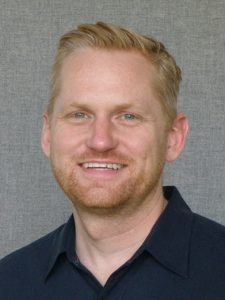 David Evans, Ph.D., CCC-SLP is an Assistant Professor in the department of Communication Sciences and Disorders at Western Washington University where he conducts research, teaches courses, and provides therapy and clinical supervision in the area of stuttering. He earned his B.A. from University of Colorado-Boulder, his M.A. from the University of Maine, and his Ph.D. from the University of Nebraska-Lincoln. David is a person who stutters, a member of the International Fluency Association, a member of ASHA’s Special Interest Group for Fluency and Fluency Disorders, and serves as the chapter leader for the Bellingham chapter of the National Stuttering Association. His research interests include how people who do and do not stutter perceive stuttering, and relations between social-emotional factors and speech motor control. David Evans, Ph.D., CCC-SLP is an Assistant Professor in the department of Communication Sciences and Disorders at Western Washington University where he conducts research, teaches courses, and provides therapy and clinical supervision in the area of stuttering. He earned his B.A. from University of Colorado-Boulder, his M.A. from the University of Maine, and his Ph.D. from the University of Nebraska-Lincoln. David is a person who stutters, a member of the International Fluency Association, a member of ASHA’s Special Interest Group for Fluency and Fluency Disorders, and serves as the chapter leader for the Bellingham chapter of the National Stuttering Association. His research interests include how people who do and do not stutter perceive stuttering, and relations between social-emotional factors and speech motor control. |
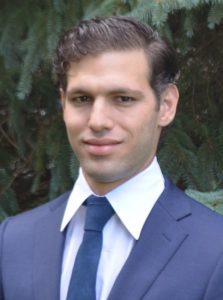 Thales De Nardo, PhDc, CCC-SLP is a doctoral candidate in Applied Language and Speech Sciences at the University of Louisiana. He has taught university courses in fluency disorders and provided speech therapy to children and adults across the United States. His research interests are in the psychosocial aspects of stuttering and the techniques and strategies used by those who stutter to improve daily social interactions. He has presented in national and international conferences and is a member of the International Stuttering Association’s Self-help and Advocacy committee. As a person who stutters himself, Thales is passionate about improving the lives of those who stutter and has led National Stuttering Association self-help chapters in California and Louisiana. He is a native of Brazil and is fluent in Portuguese. Thales De Nardo, PhDc, CCC-SLP is a doctoral candidate in Applied Language and Speech Sciences at the University of Louisiana. He has taught university courses in fluency disorders and provided speech therapy to children and adults across the United States. His research interests are in the psychosocial aspects of stuttering and the techniques and strategies used by those who stutter to improve daily social interactions. He has presented in national and international conferences and is a member of the International Stuttering Association’s Self-help and Advocacy committee. As a person who stutters himself, Thales is passionate about improving the lives of those who stutter and has led National Stuttering Association self-help chapters in California and Louisiana. He is a native of Brazil and is fluent in Portuguese. |
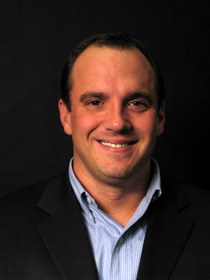 Brent A. Gregg, Ph.D., CCC-SLP completed his doctoral work at the University of Illinois, Urbana-Champaign, specializing in early childhood stuttering, under the direction of Dr. Ehud Yairi. Currently, Dr. Gregg serves as Associate Professor in the Department of Communication Sciences and Disorders at the University of Central Arkansas and as director of the UCA Stuttering Clinic. He also serves as the co-director of the Arkansas Consortium for the Ph.D. in Communication Sciences and Disorders. He is a member of the American Speech-Language-Hearing Association’s (ASHA) Special Interest Division in Fluency Disorders and is involved with the Stuttering Foundation of America. Dr. Gregg has spent time at the Michael Palin Centre in London, England and Oxford University as a visiting researcher and conference presenter. Most recently, Dr. Gregg partnered with Vanderbilt University and the Stuttering Foundation of America to offer a webinar on issues related to parent counseling and pediatric stuttering. Currently, Dr. Gregg is researching the role of resiliency in the adolescent who stutters. Brent A. Gregg, Ph.D., CCC-SLP completed his doctoral work at the University of Illinois, Urbana-Champaign, specializing in early childhood stuttering, under the direction of Dr. Ehud Yairi. Currently, Dr. Gregg serves as Associate Professor in the Department of Communication Sciences and Disorders at the University of Central Arkansas and as director of the UCA Stuttering Clinic. He also serves as the co-director of the Arkansas Consortium for the Ph.D. in Communication Sciences and Disorders. He is a member of the American Speech-Language-Hearing Association’s (ASHA) Special Interest Division in Fluency Disorders and is involved with the Stuttering Foundation of America. Dr. Gregg has spent time at the Michael Palin Centre in London, England and Oxford University as a visiting researcher and conference presenter. Most recently, Dr. Gregg partnered with Vanderbilt University and the Stuttering Foundation of America to offer a webinar on issues related to parent counseling and pediatric stuttering. Currently, Dr. Gregg is researching the role of resiliency in the adolescent who stutters. |
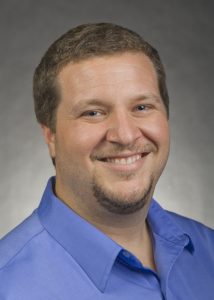 Dan Hudock, Ph.D., Certificate of Clinical Competence of Speech-Language Pathology (CCC-SLP), is an Assistant Professor at Idaho State University in Pocatello, Idaho, USA. As a person who stutters himself, he is very passionate about fluency disorders and helping those with fluency disorders. One aspect of his research interests resides in exploring effective collaborations between Speech-Language Pathologists and Mental Health Professionals for the treatment of people who stutter. He is also Director of the Northwest Center for Fluency Disorders, which hosts a two-week interprofessional intensive clinic that uses Acceptance and Commitment Therapy (ACT). For more information about research, clinical, or support opportunities please visit http://www.northwestfluency.org/. Dan Hudock, Ph.D., Certificate of Clinical Competence of Speech-Language Pathology (CCC-SLP), is an Assistant Professor at Idaho State University in Pocatello, Idaho, USA. As a person who stutters himself, he is very passionate about fluency disorders and helping those with fluency disorders. One aspect of his research interests resides in exploring effective collaborations between Speech-Language Pathologists and Mental Health Professionals for the treatment of people who stutter. He is also Director of the Northwest Center for Fluency Disorders, which hosts a two-week interprofessional intensive clinic that uses Acceptance and Commitment Therapy (ACT). For more information about research, clinical, or support opportunities please visit http://www.northwestfluency.org/. |
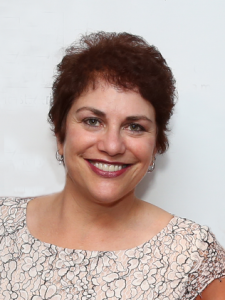 Heather L. Grossman, PhD, CCC-SLP, BCS-F has worked with children and adults who stutter for over 25 years and was among the first select group of speech-language pathologists to receive board recognition as a specialist in the treatment of fluency disorders from ASHA. She has been the Director of the American Institute for Stuttering (AIS) in NYC since 2011. Dr. Grossman is extremely active in the stuttering self-help community. She is a frequent presenter at conferences of the National Stuttering Association and FRIENDS – the National Association of Young People who Stutter as well as national and international professional conferences. Before joining AIS, she was the speech services coordinator at Hofstra University and an adjunct professor at Long Island University, Mercy College, and Queens College. She received her doctorate degree in 2008 at the University of Louisiana at Lafayette where she researched aspects of the phenomenon of voluntary stuttering. Heather L. Grossman, PhD, CCC-SLP, BCS-F has worked with children and adults who stutter for over 25 years and was among the first select group of speech-language pathologists to receive board recognition as a specialist in the treatment of fluency disorders from ASHA. She has been the Director of the American Institute for Stuttering (AIS) in NYC since 2011. Dr. Grossman is extremely active in the stuttering self-help community. She is a frequent presenter at conferences of the National Stuttering Association and FRIENDS – the National Association of Young People who Stutter as well as national and international professional conferences. Before joining AIS, she was the speech services coordinator at Hofstra University and an adjunct professor at Long Island University, Mercy College, and Queens College. She received her doctorate degree in 2008 at the University of Louisiana at Lafayette where she researched aspects of the phenomenon of voluntary stuttering. |
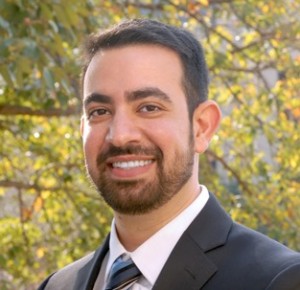 Farzan Irani, PhD., CCC-SLP is an associate professor is the Department of Communication Disorders at Texas State University where he teaches graduate courses in stuttering, research methods, and motor speech disorders. His research interests are in the psychosocial aspects of stuttering, specifically listener reactions to stuttering, and treatment effectiveness for adolescents and adults who stutter. He currently directs the Comprehensive Stuttering Therapy Program (CSTP) for Adolescents and Adults at Texas State University, which includes a summer intensive clinic and regular follow-up through the academic year via telepractice (http://www.health.txstate.edu/slhclinic/programs/cstp.html). Farzan Irani, PhD., CCC-SLP is an associate professor is the Department of Communication Disorders at Texas State University where he teaches graduate courses in stuttering, research methods, and motor speech disorders. His research interests are in the psychosocial aspects of stuttering, specifically listener reactions to stuttering, and treatment effectiveness for adolescents and adults who stutter. He currently directs the Comprehensive Stuttering Therapy Program (CSTP) for Adolescents and Adults at Texas State University, which includes a summer intensive clinic and regular follow-up through the academic year via telepractice (http://www.health.txstate.edu/slhclinic/programs/cstp.html). |
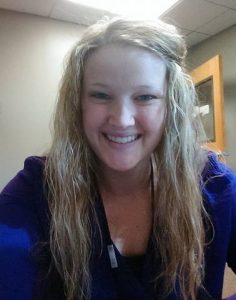 McKenzie Jemmett M.S., CCC-SLP is an individual who stutters and currently works as a Pediatric Speech Language Pathologist in Pocatello, ID. Her graduate thesis focused on covert aspects of stuttering and how holistic therapy affects these aspects. Her interests include autism spectrum disorder, sign language and fluency disorders. She is also an active member of the National Stuttering Association and serves as co-chair of her local chapter. McKenzie Jemmett M.S., CCC-SLP is an individual who stutters and currently works as a Pediatric Speech Language Pathologist in Pocatello, ID. Her graduate thesis focused on covert aspects of stuttering and how holistic therapy affects these aspects. Her interests include autism spectrum disorder, sign language and fluency disorders. She is also an active member of the National Stuttering Association and serves as co-chair of her local chapter. |
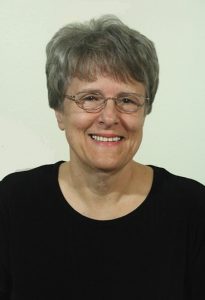
Judith Kuster CCC-SLP, BCSF-R, M.S. in speech-language pathology and M.S. in counseling, is an ASHA Fellow and emeritus professor of Communication Disorders at Minnesota State University, Mankato. She has maintained the Stuttering Home Page (http://www.mnsu.edu/comdis/kuster/stutter.html) for the past 22 years (starting as a Gopher site) and put together the ISAD online conferences from 1998-2012. Kuster is a member of the ASHA Special Interest Group #4: Fluency and Fluency Disorders, the International Stuttering Association and the International Fluency Association. She is the recipient of the ASHF DiCarlo Award for Outstanding Clinical Achievement, the 2003 IFA Distinguished Contributor Award, the 2007 ISA Outstanding Contribution Award, the 2008 ASHA Distinguished Contributor Award, and in 2009 was named to the National Stuttering Association’s Hall of Fame. |
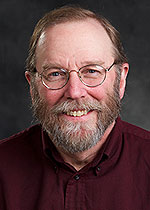 Charlie Osborne is a clinical associate professor at the University of Wisconsin – Stevens Point. He teaches the fluency disorders class and has worked with people who stutter for over 30 years. Charlie is a NSA Adult Chapter Leader and currently on ASHA’s SIG 4 Fluency and Fluency Disorders coordinating committee. Charlie Osborne is a clinical associate professor at the University of Wisconsin – Stevens Point. He teaches the fluency disorders class and has worked with people who stutter for over 30 years. Charlie is a NSA Adult Chapter Leader and currently on ASHA’s SIG 4 Fluency and Fluency Disorders coordinating committee. |
 Dr. Scott Palasik has been a Certified Speech-Language Pathologist for fifteen years. He’s an Assistant Professor at the University of Akron (UA) where he teacher graduate Fluency Disorders course (on campus and distance learning), Voice Disorders and Cleft Palate, and Support Systems for Families and Individuals with Communication Disorders, along with supervising graduate students in clinical Education. He also is the director of the Mindfulness ACT Somatic Stuttering Lab, and performs research with Acceptance and Commitment Therapy (ACT), unconscious and conscious attitudes about stuttering, and environmental and social effects pertaining to dysphagia. He has presented at many local, regional, state, and national conventions about mindfulness and ACT. He has been a member of the ACBS (Association of Contextual Behavioral Sciences) for eight years and is the President of the Ohio ACBS Chapter. He is also the co-founder of the UA Campus walk for Suicide Prevention. Dr. Scott Palasik has been a Certified Speech-Language Pathologist for fifteen years. He’s an Assistant Professor at the University of Akron (UA) where he teacher graduate Fluency Disorders course (on campus and distance learning), Voice Disorders and Cleft Palate, and Support Systems for Families and Individuals with Communication Disorders, along with supervising graduate students in clinical Education. He also is the director of the Mindfulness ACT Somatic Stuttering Lab, and performs research with Acceptance and Commitment Therapy (ACT), unconscious and conscious attitudes about stuttering, and environmental and social effects pertaining to dysphagia. He has presented at many local, regional, state, and national conventions about mindfulness and ACT. He has been a member of the ACBS (Association of Contextual Behavioral Sciences) for eight years and is the President of the Ohio ACBS Chapter. He is also the co-founder of the UA Campus walk for Suicide Prevention. |
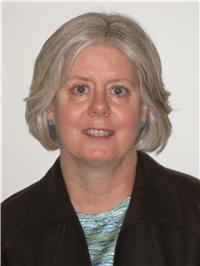 Jean Sawyer, Ph.D., CCC-SLP is an associate professor in Communication Sciences and Disorders at Illinois State University. She received her doctorate at the University of Illinois under the mentorship of Ehud Yairi. She teaches graduate and undergraduate courses in fluency, and serves as a consultant to speech-language pathologists who treat stuttering. The Illinois State chapter of the National Stuttering Association is a registered student organization, and Jean has helped organize it and is a co-chapter leader. Her research is in the characteristics of disfluencies, the distribution of disfluencies in stuttered speech, and treatment efficacy. Jean Sawyer, Ph.D., CCC-SLP is an associate professor in Communication Sciences and Disorders at Illinois State University. She received her doctorate at the University of Illinois under the mentorship of Ehud Yairi. She teaches graduate and undergraduate courses in fluency, and serves as a consultant to speech-language pathologists who treat stuttering. The Illinois State chapter of the National Stuttering Association is a registered student organization, and Jean has helped organize it and is a co-chapter leader. Her research is in the characteristics of disfluencies, the distribution of disfluencies in stuttered speech, and treatment efficacy. |
 Ellen-Marie Silverman, Ph.D. The author of “Mindfulness & Stuttering” and “Relief From Stuttering,” Ellen-Marie Silverman earned the Ph.D. in Speech Pathology from The University of Iowa. She is a Fellow of The American Speech-Hearing-Language Association and a Full Member of Sigma Xi. Now retired, she was a member of several university faculties and published more than 50 papers in peer-reviewed journals primarily on the subjects of children’s disfluency and women’s stuttering problems. She maintained a private practice. Ellen-Marie Silverman, Ph.D. The author of “Mindfulness & Stuttering” and “Relief From Stuttering,” Ellen-Marie Silverman earned the Ph.D. in Speech Pathology from The University of Iowa. She is a Fellow of The American Speech-Hearing-Language Association and a Full Member of Sigma Xi. Now retired, she was a member of several university faculties and published more than 50 papers in peer-reviewed journals primarily on the subjects of children’s disfluency and women’s stuttering problems. She maintained a private practice.
Currently, she is completing “She-Gate,” the final volume of The Jason Loring Trilogy, a fictional account of one person living with a stuttering problem from childhood through middle age that began with publication of the book, “Jason’s Secret,” in which the title character Jason Loring, 10, was desperate to hide his stuttering. Poet, exhibited painter and photographer, and all-around dabbler, she continues to write fiction. Dr. Silverman has had a stuttering problem. |
 Vivian Sisskin is a clinical professor in the Department of Hearing and Speech Sciences at the University of Maryland. She is an ASHA Fellow and Board Certified Specialist in Fluency and Fluency Disorders. She served as Coordinator for ASHA’s Special Interest Group 4 (Fluency and Fluency Disorders), and received ASHA’s Media Champion award for promoting awareness of stuttering in the media. Sisskin served on the Board of Directors of the National Stuttering Association and the American Board on Fluency and Fluency Disorders. She is a faculty member for the Stuttering Foundation’s Mid-Atlantic Workshop and the Workshop for University Instructors in Stuttering. She serves as book review editor for the Journal of Fluency Disorders and is chair-elect for ASHA’s Council for Clinical Certification in Audiology and Speech-Language Pathology (CFCC). Her articles, workshops and DVDs cover treatment for stuttering, principles of group therapy, atypical speech fluency disorders, and communication strategies for children with autism. She is the owner of the Sisskin Stuttering Center in the Washington DC metro area. Vivian Sisskin is a clinical professor in the Department of Hearing and Speech Sciences at the University of Maryland. She is an ASHA Fellow and Board Certified Specialist in Fluency and Fluency Disorders. She served as Coordinator for ASHA’s Special Interest Group 4 (Fluency and Fluency Disorders), and received ASHA’s Media Champion award for promoting awareness of stuttering in the media. Sisskin served on the Board of Directors of the National Stuttering Association and the American Board on Fluency and Fluency Disorders. She is a faculty member for the Stuttering Foundation’s Mid-Atlantic Workshop and the Workshop for University Instructors in Stuttering. She serves as book review editor for the Journal of Fluency Disorders and is chair-elect for ASHA’s Council for Clinical Certification in Audiology and Speech-Language Pathology (CFCC). Her articles, workshops and DVDs cover treatment for stuttering, principles of group therapy, atypical speech fluency disorders, and communication strategies for children with autism. She is the owner of the Sisskin Stuttering Center in the Washington DC metro area. |
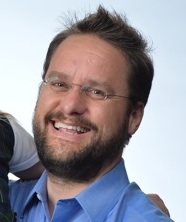 Gregory Snyder, Ph.D. CCC-SLP is an Associate Professor at The University of Mississippi. He eared his degree from East Carolina University in 2003 and has research emphases in (among a variety of areas) prosthetic fluency enhancement, and the application of motor theory relative to stuttering and articulation disorders. Greg also held an appointment at Gallaudet University, which exposed him to the existence of stuttering in multiple expressive modalities; as a result, he conducts ongoing research in this area as well. Gregory Snyder, Ph.D. CCC-SLP is an Associate Professor at The University of Mississippi. He eared his degree from East Carolina University in 2003 and has research emphases in (among a variety of areas) prosthetic fluency enhancement, and the application of motor theory relative to stuttering and articulation disorders. Greg also held an appointment at Gallaudet University, which exposed him to the existence of stuttering in multiple expressive modalities; as a result, he conducts ongoing research in this area as well. |
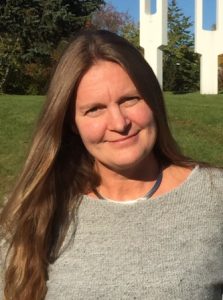 Hilda Sønsterud is a SLP in Oslo, Norway. She works at Statped, Department for speech and language disorders. Statped is a national centre with interdisciplinary expertise in the field of speech, language and communication disorders. Hilda works primarily with treatment and research related to fluency disorders. She runs courses within the field of stuttering and cluttering, and she provides clinical practice for SLPs and SLP students. For the time being, she is doing her PhD-project at the University of Oslo, Department of Psychology, which involves a collaboration between the National Stuttering Association, Statped, the University of Oslo, and the University of Reading, England. The project is a treatment study, and it is entitled: “Individualized therapy for adults who stutter: a multiple single case study evaluation”. Hilda is a national representative in the International Cluttering Association. Hilda Sønsterud is a SLP in Oslo, Norway. She works at Statped, Department for speech and language disorders. Statped is a national centre with interdisciplinary expertise in the field of speech, language and communication disorders. Hilda works primarily with treatment and research related to fluency disorders. She runs courses within the field of stuttering and cluttering, and she provides clinical practice for SLPs and SLP students. For the time being, she is doing her PhD-project at the University of Oslo, Department of Psychology, which involves a collaboration between the National Stuttering Association, Statped, the University of Oslo, and the University of Reading, England. The project is a treatment study, and it is entitled: “Individualized therapy for adults who stutter: a multiple single case study evaluation”. Hilda is a national representative in the International Cluttering Association. |
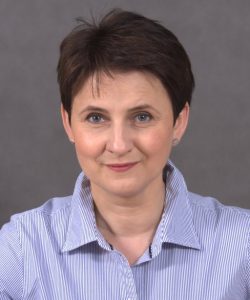 Katarzyna Węsierska, Ph.D., is a lecturer at the University of Silesia in Katowice (Poland) and the founder and a speech-language therapists at the Logopedic Centre in Katowice. She was the first Polish graduate of the European Clinical Specialization in Fluency Disorders (ECSF). She is accredited by the Michael Palin Centre for Stammering in London to train Polish SLTs to use the Palin Parent-Child Interaction Therapy for Children under Seven Who Stammer. In her research and clinical practice she focuses mainly on fluency disorders with special interests in early intervention. She coordinates a self-help group for people who stutter and/or clutter at the University of Silesia. She cooperates with international organizations and researchers from different countries to disseminate knowledge and change social attitudes towards fluency disorders. She co-organized two editions of the International Conference of Logopedics entitled Fluency Disorders – Theory and Practice at the University of Silesia in Poland. Katarzyna Węsierska, Ph.D., is a lecturer at the University of Silesia in Katowice (Poland) and the founder and a speech-language therapists at the Logopedic Centre in Katowice. She was the first Polish graduate of the European Clinical Specialization in Fluency Disorders (ECSF). She is accredited by the Michael Palin Centre for Stammering in London to train Polish SLTs to use the Palin Parent-Child Interaction Therapy for Children under Seven Who Stammer. In her research and clinical practice she focuses mainly on fluency disorders with special interests in early intervention. She coordinates a self-help group for people who stutter and/or clutter at the University of Silesia. She cooperates with international organizations and researchers from different countries to disseminate knowledge and change social attitudes towards fluency disorders. She co-organized two editions of the International Conference of Logopedics entitled Fluency Disorders – Theory and Practice at the University of Silesia in Poland. |
 Dale F. Williams, Ph.D., CCC-SLP, BRS-FD is a Professor of Communication Sciences and Disorders and Director of the Fluency Clinic at Florida Atlantic University. In addition, he is a consultant for Language Learning Intervention and Professional Speech Services. A board certified specialist in fluency, Dr. Williams served as Chair of the Specialty Board on Fluency Disorders from 2008 to 2010. He has coordinated the Boca Raton chapter of the National Stuttering Association since 1996. His publications include the books Stuttering Recovery: Personal and Empirical Perspectives (Psychology Press), Communication Sciences and Disorders: An Introduction to the Professions (Psychology Press), and the newly released Shining a Light on Stuttering: How One Man Used Comedy to Turn his Impairment into Applause (The Brainary), co-authored with comedian Jaik Campbell. Dale F. Williams, Ph.D., CCC-SLP, BRS-FD is a Professor of Communication Sciences and Disorders and Director of the Fluency Clinic at Florida Atlantic University. In addition, he is a consultant for Language Learning Intervention and Professional Speech Services. A board certified specialist in fluency, Dr. Williams served as Chair of the Specialty Board on Fluency Disorders from 2008 to 2010. He has coordinated the Boca Raton chapter of the National Stuttering Association since 1996. His publications include the books Stuttering Recovery: Personal and Empirical Perspectives (Psychology Press), Communication Sciences and Disorders: An Introduction to the Professions (Psychology Press), and the newly released Shining a Light on Stuttering: How One Man Used Comedy to Turn his Impairment into Applause (The Brainary), co-authored with comedian Jaik Campbell. |
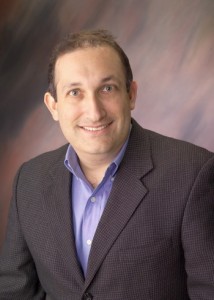 J. Scott Yaruss, PhD, CCC-SLP, BRS-FD, ASHA Fellow, is an associate professor and director of the Master’s Degree programs in Speech-Language Pathology at the University of Pittsburgh. His research examines methods for evaluating treatment outcomes in people who stutter. He has published more than 50 papers in peer-reviewed journals and nearly 100 other articles, papers, and chapters on stuttering. He is author, co-author, or editor of several booklets, books, and brochures on stuttering, including the Overall Assessment of the Speaker’s Experience of Stuttering (OASES; Pearson) as well as School-age Stuttering Therapy: A Practical Guide and the Minimizing Bullying for Children Who Stutter series (Stuttering Therapy Resources, Inc.). J. Scott Yaruss, PhD, CCC-SLP, BRS-FD, ASHA Fellow, is an associate professor and director of the Master’s Degree programs in Speech-Language Pathology at the University of Pittsburgh. His research examines methods for evaluating treatment outcomes in people who stutter. He has published more than 50 papers in peer-reviewed journals and nearly 100 other articles, papers, and chapters on stuttering. He is author, co-author, or editor of several booklets, books, and brochures on stuttering, including the Overall Assessment of the Speaker’s Experience of Stuttering (OASES; Pearson) as well as School-age Stuttering Therapy: A Practical Guide and the Minimizing Bullying for Children Who Stutter series (Stuttering Therapy Resources, Inc.). |
![]()
